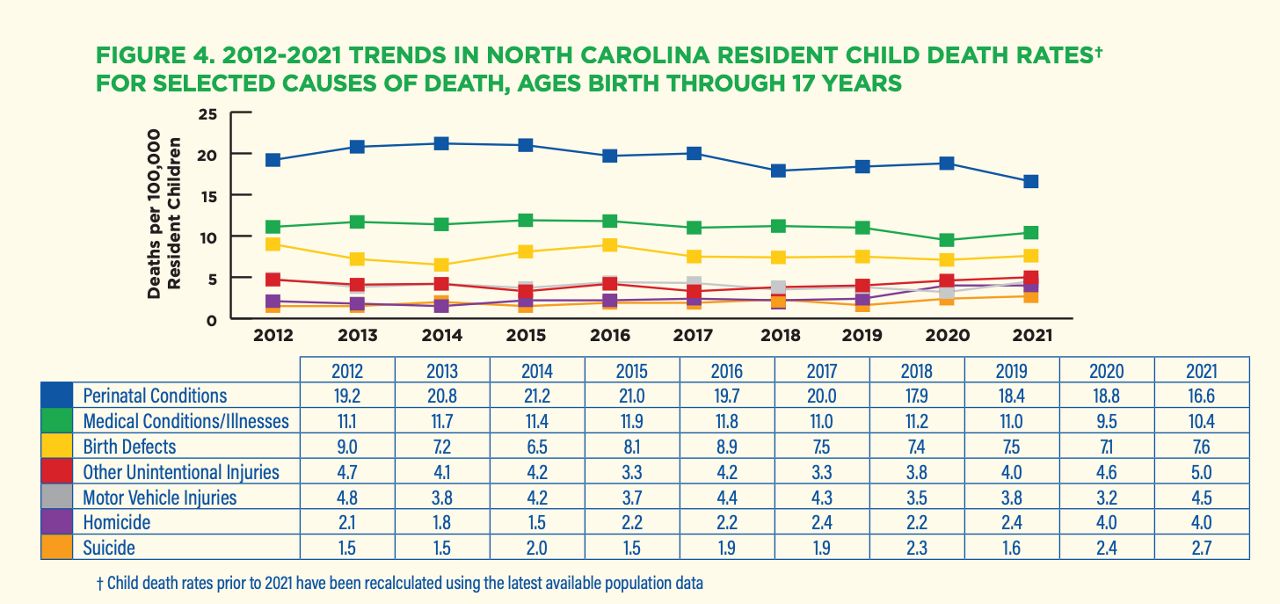RALEIGH, N.C. — There’s new disturbing data that shows a significant increase in youth firearm deaths as well as a mental health crisis among kids. North Carolina’s Child Fatality Task Force released its annual report and one of the group’s top recommendations is to increase funding for school psychologists, nurses and social workers, because right now the state doesn’t have enough.
North Carolina’s Child Fatality Task Force released its annual report, including recommendations for improvement
The group found there’s a significant increase in youth firearm deaths as well as a mental health crisis among kids
A top recommendation is to increase funding for school psychologists, nurses and social workers
According to the task force’s report, the national recommendation for school psychologists is one for every 500 students. North Carolina has one psychologist for every 1,815 students.
“In thinking about the worldwide pandemic, it was definitely a challenge for us as adults but more so for our kids,” said Dr. Jacqueline Smith, the associate medical director at Monarch.
As a mom and psychiatrist, Smith is well aware of the challenges kids are facing today.
“We as adults, we have problem-solving skills and strengths and things to build on, to deal with adversity and uncertainty and loss. Children not quite as much,” Smith said.
When the state’s child fatality task force released its annual report, Smith wasn’t surprised by its findings.

“We saw that kids were more likely to visit the emergency room with complaints of self-harm or suicidal attempts or ideation or thoughts about suicide. We also saw an increase in certain kinds of deaths, those deaths from suicide from car crashes from use of guns,” Smith said.
The task force also reported the state is behind when it comes to ideal ratios of professionals helping children with mental health.
“There is a certain lack of infrastructure in the school system due to lack of funding, changes in workforce within schools, where they just don't have the school counselors, the school psychologists, the nurses,” Smith said.“There is a certain lack of infrastructure in the school system due to lack of funding, changes in workforce within schools, where they just don't have the school counselors, the school psychologists, the nurses,” Smith said.
Smith says kids notice when there isn’t someone around to lean on.
“Kids pick up on that and at a certain point they stop asking for help. When they stop asking for help, they suffer. When they suffer, they get worse,” Smith said.
She hopes this report is eye-opening for the people in charge with funding schools so these alarming trends don’t continue.
“We've got to make sure that there is good recruitment, retention, good training for that school staff so that when they're there, they feel competent in what they do, they know where to send a kid if a kid has a particular mental health challenge,” Smith said.
As for things parents can do, Smith says the main thing is to observe your child. Parents know when something seems off so it’s important to keep an eye on a child’s behavior. She also says establishing a routine is very helpful in keeping kids healthy and safe.
The state’s child fatality task force was created in 1991. Since then, its recommendations and efforts have helped advance many laws and initiatives, including a new law in 2020 requiring suicide prevention training for school personnel.
If you or someone you know needs help, call the Suicide and Crisis Lifeline at 988.






